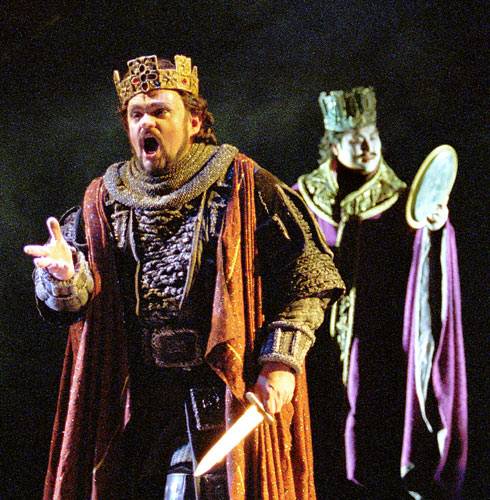Ambition is the motivation that strongly drives one to achieve what they desire. Macbeth has great ambition. It can be said that Macbeth’s strong ambition is what leads him to his misery.
In the beginning of Macbeth, Macbeth’s ambition drove him to beat the king of Norway. He single-handedly took on the enemy forces. The bleeding soldier explained “And his fortune on his damned quarrel smiling,/Show’d like a rebel’s wh***: but all’s too weak;/For brave Macbeth – well he deserves that name” (1.2. 16-18).
It can be said that Macbeth’s great courage in the losing battle was fueled by his ambition significantly and was awarded the thane of Cawdor for his success. As he saw the withes’ prophesizes are coming true, he wanted more
Being the thane of Cawdor was simply not enough so his desire was to become king and he decided to act upon it. Aided and abetted by the witches’ prophecies and Lady Macbeth, his ambition leads him to kill the king.
Ross announces that Macbeth will take over and become the king. “thriftless ambition, that wilt ravin up/Thine own life’s means! Then ‘tis most like/The sovereignty will fall upon Macbeth” (2.4. 37-39). Macbeth’s ambition leads him to commit treason and murder as he kills the god’s chosen one, Duncan.
Then Macbeth kills his best friend, Banquo because Banquo knew how he became king. After the murderer returns, Macbeth discusses “There’s blood upon thy face./ Tis Banquo’s then./Tis better thee without, than he within” (3.4. 14-16). Macbeth feels no grief towards the death of his best friend which just shows how much his ambition has taken over his feelings.
As Macbeth fails at covering his evil deeds and all his nobles go against him. To hide what he has done, his ambition causes him to commit more murders and he kills Macduff’s son and wife. Hearing this news Macduff argues “Let us rather/Hold fast the mortal sword, and like good men/Bestride our down-fall’n birthdom” (4.3. 3-5).
Macduff is ready to pick up his sword and avenge his family’s death. Macbeth’s ambition leads him to this tragedy, his last battle that he will ever fight. With all his men against him, Macbeth is still brave enough to go to battle. The ambition made him feel invincible.
On the battlefield, Macbeth bravely says “why should I play the Roman fool, and die/On mine own sword? Whiles, I see lives, the gashes/Do better upon them (5.8. 1-3). Macbeth is fearless in the battle; with virtually no one on his side, he fought to his last breath.
In conclusion, through all these events, it is clear that Macbeth is headed on a path for tragedy; which was started, and strongly fueled by his ambition. It gave him the thane of Cawdor and the hunger for more success.
Then his ambition impelled him to kill Duncan so he could become King. He eventually committed many more murders until he had no one on his side but the ambition that stayed with him till his last breath.
Work Cited:
Shakespeare, William, “Macbeth.” Harcourt Brace and Company, Canada, LTD. Toronto, Ontario 1988. Editor: Margaret Kortes

